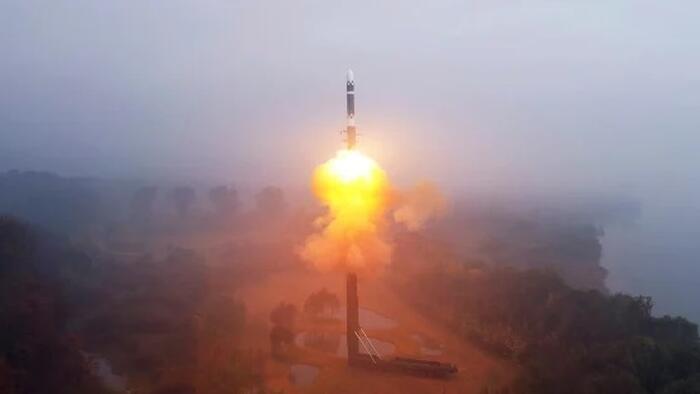The recent test-firing of an intercontinental ballistic missile (ICBM) by North Korea has generated significant geopolitical repercussions, marking a pivotal moment in regional security dynamics. The missile’s launch, described as having the longest flight time ever recorded for a North Korean ballistic missile, has drawn swift and stern responses from South Korea and the United States. South Korea has imposed new sanctions on over a dozen North Korean individuals and entities, underlining its condemnation of the missile test. In parallel, the US appears poised to enhance its own sanctions against North Korea, which suggests escalating tensions between the parties involved. Kim Jong Un’s regime has reacted defiantly to these developments, asserting that the successful test has cemented North Korea’s position as a formidable power in nuclear weaponry and asserting that the country’s advancements are now “irreversible.”
The missile launched has been identified by North Korean officials as the Hwasong-19, which they have proclaimed to be “the world’s strongest strategic missile.” This characterization raises concerns due to the missile’s potential capability to reach the continental United States, as it is designed to carry nuclear warheads over vast distances. Kim claimed the missile’s enhanced specifications, including greater fuel capacity for increased thrust and a potentially extended range. The timing of this launch has not gone unnoticed, coinciding strategically with the lead-up to the US presidential elections, indicating North Korea’s intent to demonstrate military prowess at a politically sensitive moment.
In addition to military implications, the diplomatic rhetoric surrounding the missile test has become increasingly inflammatory. North Korean Foreign Minister Choe Son Hui, during a meeting with Russian Foreign Minister Sergei Lavrov in Moscow, accused the United States and South Korea of orchestrating plots for a nuclear strike against North Korea. These claims, although lacking concrete evidence, have been framed within the context of broader military cooperation between Washington and Seoul—which North Korea perceives as a direct threat to its sovereignty. This situation highlights the escalating sense of paranoia within the North Korean leadership, reinforcing their narrative of victimization in the face of a perceived existential threat.
Moreover, the strengthening relationship between North Korea and Russia has emerged as a crucial element in this geopolitical landscape. The two countries have increasingly bolstered their defense ties over the past year, culminating in a new pact earlier this summer. This partnership suggests a potential military alliance that could change the balance of power in the region. Choe’s remarks—including a pledge of support for Russia until it achieves “victory” in Ukraine—illustrate the deepening strategic cooperation that could further challenge Western influence in the area.
In response to these developments, the international community is grappling with the implications of a nuclear-capable North Korea that is openly allied with Russia. The challenge for the US and its allies involves recalibrating diplomatic strategies to address both North Korean provocations and the broader implications of a strengthened Russia-North Korea relationship. As both South Korea and the US prepare for potential escalations, the urgency to devise an effective response mechanism becomes paramount. The need for unity among allies, as well as strategic engagement with adversaries, is critical in averting a potential military confrontation.
Ultimately, the latest events surrounding North Korea’s missile launch signal a notable escalation in tensions on the Korean Peninsula and beyond. With the implications reaching as far as the US electoral landscape and the ongoing conflict between Russia and Ukraine, the interconnected nature of these geopolitical issues is increasingly evident. As military developments unfold, the responses from the international community will likely shape the future trajectory of security and diplomacy in the region, necessitating a multi-faceted approach to not only manage immediate threats but also to foster long-term stability.

